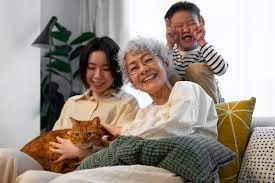
More Paws Than Cradles: Japan’s New Reality
In a remarkable demographic shift, Japan has officially become a nation where pets outnumber children. With an estimated 16 million pets, including dogs, cats, and other animals, the country now has more furry friends than it does children under the age of 15, with approximately 14 million youngsters. This trend, which has been gaining momentum in recent years, has left experts scratching their heads, wondering what’s behind this sudden change in societal values.
Rising costs and urban stress are leading young couples to opt for pets over kids
One of the primary reasons driving this shift is the rising cost of living in Japan. With the country’s notorious reputation for high prices, young couples are finding it increasingly difficult to afford the expenses associated with raising a child. From education to healthcare, the costs can be staggering, leaving many young families struggling to make ends meet. In contrast, pets are seen as a more affordable option, requiring significantly less financial investment.
Urban stress is another significant factor contributing to this trend. Japan’s densely populated cities, such as Tokyo and Osaka, can be overwhelming, with cramped living spaces and fast-paced lifestyles taking a toll on mental health. With the added pressure of raising a child, many young couples are finding it difficult to cope, leading them to seek comfort and companionship in pets instead.
Changing lifestyles and evolving views on family and responsibility
This trend also reflects deeper societal changes taking place in Japan. As the country’s population ages, there is a growing shift towards a more individualistic lifestyle. With fewer people getting married and having children, and a greater emphasis on personal freedom and autonomy, pets have become a more attractive option for many young people.
Furthermore, the concept of family and responsibility is evolving in Japan. With more women entering the workforce and pursuing careers, the traditional nuclear family structure is no longer the norm. As a result, many young couples are opting for a more flexible approach to family planning, with pets providing a sense of companionship and connection without the added responsibilities that come with raising a child.
Experts weigh in on the significance of this trend
Dr. Yumi Matsubara, a leading demographer at Japan’s National Institute of Population and Social Security Research, believes that this trend reflects a larger shift in societal values. “Japan is facing a significant demographic challenge, with a rapidly aging population and declining birth rates. This trend is a reflection of the changing values and priorities of young people in Japan, who are increasingly valuing flexibility and autonomy over traditional notions of family and responsibility.”
Dr. Kenji Kubo, a sociologist at Tokyo’s Sophia University, agrees, noting that pets are becoming an integral part of modern Japanese family life. “Pets are providing a sense of companionship and connection for young couples who may not be ready or able to start a family. They’re also becoming a symbol of independence and freedom, which is particularly appealing to young people in Japan’s rapidly changing society.”
Conclusion
In conclusion, Japan’s shift towards a pet-centric society is a significant demographic trend that reflects deeper societal changes and evolving views on family and responsibility. As the country’s population ages and traditional notions of family life continue to evolve, it’s likely that this trend will only continue to gain momentum. Whether or not this is a cause for concern, it’s undeniable that pets are playing an increasingly important role in modern Japanese family life.
Source:



